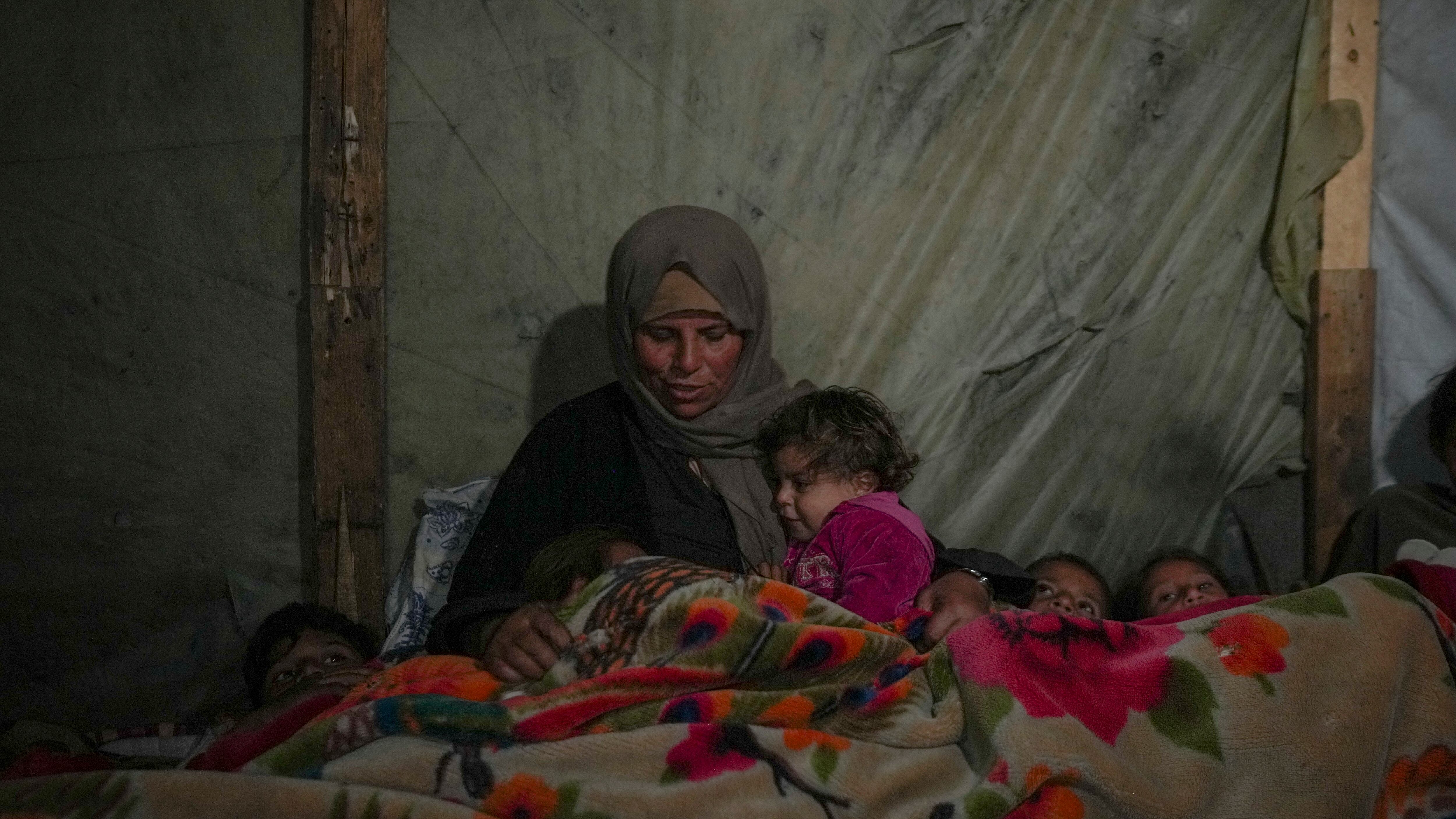JAN YUNIS, Gaza Strip (AP) — Winter is hitting the Gaza Strip and many of the nearly 2 million Palestinians displaced by the devastating 14-month war with Israel are struggling to protect themselves from the wind, cold, and rain.
There is a shortage of blankets and warm clothing, little wood for making fire, and the makeshift tents and tarps in which families live are very worn out after months of intensive use, according to humanitarian workers and residents.
PUBLICIDAD
Shadia Aiyada, who moved from the southern city of Rafah to the coastal area of Muwasi, only has a blanket and a hot water bottle to keep her eight children from shivering inside their fragile tent.
"We get scared every time the weather forecast announces rainy and windy days because our tents get lifted by the wind. We fear that one day the strong windy weather will knock down our tents while we are inside," he said.
With nighttime temperatures dropping to almost zero degrees, Aiyada fears that her children may get sick due to not having warm clothing.
"When they fled their home, their children only had their summer clothes," she said. "They have had to borrow from family and friends to stay warm."
The United Nations has warned that people living in precarious makeshift shelters may not survive the winter. At least 945,000 people need winter supplies, which have become prohibitively expensive in Gaza, the UN said this week. The organization also fears that infectious diseases, which increased last winter, may rise again due to the increase in malnutrition.
The United Nations Relief and Works Agency for Palestine Refugees, known as UNRWA, has been planning all year for winter in Gaza, but the aid that was able to enter the territory is not enough, said Louise Wateridge, spokesperson for the agency.
The UNRWA distributed 6,000 tents over the past four weeks in northern Gaza, but was unable to take them to other parts of the Strip, including areas where there has been fighting. Around 22,000 tents are stuck in Jordan and 600,000 blankets and 33 truckloads of mattresses are in Egypt since the summer because the agency does not have Israeli approval or a safe route to deliver them to Gaza, and because it had to prioritize food aid, Wateridge said.
Many of the mattresses and blankets have since been looted or destroyed by the weather and rodents, he added.
The International Rescue Committee is struggling to deliver winter clothing for children because many permits are needed, said Dionne Wong, the organization's deputy director of programs for the occupied Palestinian territories.
"Wong said, 'The Palestinians' ability to prepare for winter is very limited.'"
The Israeli government agency responsible for coordinating aid shipments to Gaza said in a statement that Israel has been working for months with international organizations to prepare Gaza for the winter, including facilitating the delivery of heaters, warm clothing, tents, and blankets to the territory.
More than 45,000 Palestinians have died in the war, according to the Gaza Ministry of Health. The count does not distinguish between civilians and combatants, but it notes that more than half of the victims are women and children. The Israeli Army says it has killed more than 17,000 militants, without providing evidence.
The current war began after Hamas attacked southern Israel in October 2023, where the armed group killed 1,200 people and took 250 hostages to Gaza.
Negotiators say that Israel and Hamas are moving towards a ceasefire agreement, which would include an increase in aid to the territory.
For now, the winter clothing for sale in the markets of Gaza is too expensive for most people, residents and humanitarian workers said.
Reda Abu Zarada, a 50-year-old man who had to leave northern Gaza with his family, said that adults sleep with the children in their arms to keep them warm inside their tent.
"The rats walk over us at night because we don't have doors and the tents are torn. The blankets don't keep us warm. We feel the cold coming up from the ground. We wake up frozen in the morning," he said. "I'm afraid of waking up one day and finding one of the children frozen to death."
On Thursday night, he had to endure the pain in his knee exacerbated by the cold weather to fry zucchinis over a fire made of paper and cardboard outside his tent. He hoped that the small meal would warm up the children before bedtime.
Omar Shabet, a displaced person from Gaza City along with his three children, feared that lighting a fire outside his tent would make his family a target for Israeli warplanes. “We enter our tents after sunset and do not go out because it is very cold and it gets colder towards midnight,” he said. “My 7-year-old daughter almost cries at night because of the cold she feels.”
